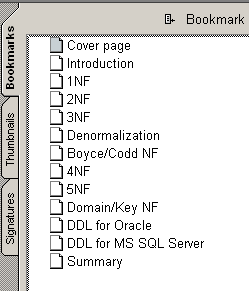 |
|||||||
|
|
Database Normalization explained.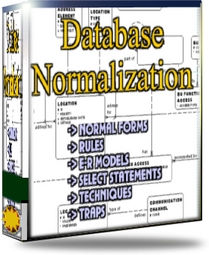
TopicUnderstanding and mastering database normalization techniques is essential in order to achieve a high performance database design for your system. If your design doesn't conform to (at least) the Third Normal Form (3NF), chances are high that you will find it hard to achieve the performance needed for a successful application.Furthermore, you will find that writing good DML-statements (SELECT, UPDATE, INSERT or DELETE) is difficult, and sometimes actually impossible, without using a lot of procedural coding (PL/SQL in Oracle, VB/C# in Microsoft products). Many "experts" will tell you that if you do database normalization up to (and including) the Third Normal Form, you're well off. The Database Normalization eBook shows you that this a far too easy approach, and it is richly documented with graphical Entity Relationship and Server Diagram examples. Before we proceed, may I ask what is your
profession? (If no option matches you, just skip it):
The Five Normal FormsThe Database Normalization eBook will walk you through all the 5 Normal Forms in database normalization normally used to analyze data models in the making. We will be starting with formal definitions, and then explore and explain them in plain language.The mission of this 50-page eBook is not to deliver academic definitions of the normal forms, but to communicate the author's practical experience in data modeling using database normalization techniques, built on nearly 30 years of business experience with data modeling for government, industrial, communications and other large relational database customers. The Database Normalization eBook also contains separate chapters on Boyce/Codd Normal Form (BCNF), and Domain Key Normal Form (DKNF). Database Normalization eBook:
|
||||||
| "Your eBook is now mandatory reading for my project
members." Sabrina, Project Manager, Germany |
Target audiences:
Software project managers
- Understand the difference and importance of database analysis and design vs. programming
- Reveal why programmers decide differently than the business needs, and why it can create a disaster
- Get on even terms with the technologists with no-fuzz language
- Speed up the design process
- Cut down on time and money spent
- You pull the shots
- Why all the talk about performance considerations is non-essential
- Compressed information, takes less time to learn and apply
- Easy, down-to-earth graphic examples
- Conceptual modeling examples (ER diagrams)
- Logical modeling examples(Server diagrams)
- Create functionality-rich structures with maximum business flexibility
- Design for business scalability
- All within budget and time!
| "I'm myself (since 1996) in the data modeling business
(OLTP and OLAP, with accent on OLAP for the past 5 year). I own and have read about 30 - 40 books on this topic (practically most of the available and out of print books) and I'm still impressed by your website and ebooks. I like a lot of things about the keynotes and ebooks, what I like most is the balance you have managed to keep between a dry subject / theory and a clear "down-to-earth" treatment of the subject, without sacrificing any of the important aspects. The examples in the normalisation ebook are also very good." Georg Breazu, Senior Systems Consultant, Germany |
System analysts and programmers
- Compare normalized and denormalized structures
- Experience consequences of poor design on your programs
- Why the business model is more important than easy programming
- Complete DDL scripts so you can experiment with database tables
- Avoid poor-performing databases and programs
- Speed up the development process and avoid unneccesary time and cost spendings
- Highten the quality of the database as well as your SW
- Understand why poor normalization can make it impossible to write some DML-statements against the database
| "I've seen good, bad and butt ugly database design
books. The database normalisation eBook is in the category of good. It
is a concise guide, based on scientific principles and common sense." Philip, Systems Analyst, United Kingdom |
Students and teachers
- Explain database normalization in understandable (read: plain English) terms
- Ready-made examples for direct use
- Play with the ready-made database structures
- See consequences all the way from conceptual modeling to physical database structures
- Shorten down time to understand and master the 5 Normal Forms
- Instant download: Get going NOW!
- Teachers: Have your answers ready: The questions will come...
- Students: Outsmart your teacher
| "Your eBook has been very helpful to both me and my
students." Robert, Teacher, USA |
Avoid the situation of this teacher, taken from a desperate post on a forum on the Internet:
"I am about to start teaching Normalization to my students, and was wondering whether anyone can recommend an idiot's guide to BCNF for me! I am fine up to 3rd NF, then confusion sets in!... I would really like a simple explanation as any reference to BCNF which I have found so far on the Net is coughed in technical terms rather than words of less than two syllables..."
(you will find out that this is no big deal...)
Consistent examples
The Database Normalization eBook uses a consistent theme of accounts, departments, projects and transactions throughout, so you can easily review the consequences as we move from First Normal Form through all the accepted Normal Forms.Entity Relationship and Database diagrams
Pros and cons of denormalization with the aim of improving performance are also discussed, and which consequences denormalization may have on your database. The Database Normalization eBook is illustrated with more than 20 entity relationship diagrams, as well as database (server) models, and SELECT statements that use the model.Complete DDL scripts
The Database Normalization eBook includes complete DDL (Data Definition Language) scripts for creating the tables, indexes and constraints from the example database model in the eBook, for both Oracle and MS SQL Server. This will give you a view of the components that need to be created in order to build a fully normalized sample database.If you are serious about understanding how databases are designed for maximum performance and minimum (no) redundancy, then you should know the details of database normalization.
How to order
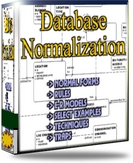 The Database Normalization eBook is an easy download.
ClickBank is used
as a secure authorized billing agent for your safety. You place your
order with ClickBank, who validate your credit card. Upon successful
payment you will be returned to a special page on this site to make the
download of the Database Normalization eBook. The eBook is a PDF file,
approx. 480 Kb, and downloading time may vary depending upon your
computer's Internet connection.
The Database Normalization eBook is an easy download.
ClickBank is used
as a secure authorized billing agent for your safety. You place your
order with ClickBank, who validate your credit card. Upon successful
payment you will be returned to a special page on this site to make the
download of the Database Normalization eBook. The eBook is a PDF file,
approx. 480 Kb, and downloading time may vary depending upon your
computer's Internet connection.
Within a few seconds after payment, you can start reading and discovering in detail about all the accepted Normal Forms in database modeling and design, translated into straight-forward English, understandable language.
60-Day, 100% unconditional money-back guarantee:
"DR. PHIL" MCGRAW
To get your own, personal copy, click
here to receive instant download instructions:

Only 37.00 US $
Additional VAT may be added inside the European Union, and where else applicable.Database Normalization is a key element to
high-performing database
designs.
Every purchase of the Database Normalization
eBook is highly appreciated, as it is a key factor for keeping this
website alive, covering running costs. Be a part of it!
![]() (The Database Normalization eBook is delivered in PDF
format. If you don't have Acrobat Reader, get a free version: Click on
the Acrobat Reader image.)
(The Database Normalization eBook is delivered in PDF
format. If you don't have Acrobat Reader, get a free version: Click on
the Acrobat Reader image.)
| |
Exclusive interviews with:
Steven Feuerstein, PLSQL expert
Donald Burleson, Top IT consultant
Free eBook
Subscribe to my newsletter and get my ebook on Entity Relationship Modeling Principles as a free gift: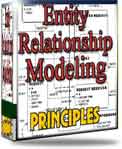
What visitors say...
I have been in the database field for 10+ years and I have never before come across such a useful site. Thank you for taking the time to put this site together."
Mike, USA
DB Normalization
Analysis Phase
Database Keys
DB Glossary
Appl.Architecture
Oracle DBA
MySQL DBA
SQL Server DBA
Install Oracle
Install SQL Server
Proj.Management
Oracle Constraint
Programming Tips
Database Normalization eBook:
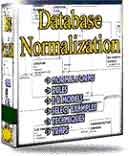
All rights reserved.
All information contained on this website is for informational purposes only.
Disclaimer: www.databasedesign-resource.com does not warrant any company, product, service or any content contained herein.
Return to top
The name Oracle is a trademark of Oracle Corporation.
The names MS Access/MS SQL Server are trademarks of Microsoft Corporation.
Any other names used on this website may be trademarks of their respective owners, which I fully respect.
